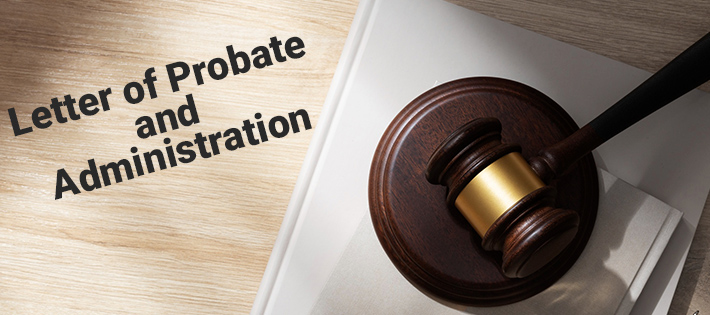What Is the Difference Between a Grant of Probate and Letters of Administration?
Everyone's estate in Singapore includes everything owned solely in the name of the decedent's singular persona, including real estate and financial assets like bank accounts and stocks and bonds. In most cases, assets held in joint names are transferred to the surviving owner.
The Grant of Representation is a legal document that gives relatives the power to terminate bank accounts, sell property, and invest money on their behalf. However, things may get a little tricky here. Grants of Probate or Letters of Administration are the two types of Grants of Representation that may be awarded.
In cases where the decedent left a will, a Grant of Probate is awarded to the specified executors, while Letters of Administration are issued to those entitled under the provisions of intestacy.
A letter of probate and administration might assist you in choosing which grant to apply for.
What Exactly Is a Probate Grant?
A minimum of one executor must be named in a will. The executor is entrusted with a great deal of power and authority, so care should be used in selecting this individual.
Assets may be sold, money may be transferred to recipients listed in the will, and necessary chores can be completed by the executor. Because of this, the candidate must be trustworthy, competent, and capable of handling complicated administrative operations.
Executors can manage the estate, but even if they are designated in the will and the appointment takes effect immediately upon death, it isn't always enough. Without a Provider of Probate, most financial institutions will not immediately grant access to the bank accounts of the executor of a will. Each bank will have its own set of conditions and thresholds for releasing cash. The Grant of Probate is a legal declaration that the Will is legitimate and has been properly recorded by the Court.
It is only after the Grant of Probate has been obtained that the executors of the estate are designated in detail. Financial institutions must have access to this data to make sure that only those individuals receiving payments are authorised to do so. This procedure has been implemented to safeguard both financial institutions and family members
When is a Grant of Probate Necessary for a Trust?
It is a court-issued instrument that grants the executors of a will the authority to carry out a deceased person's last desires as stated in the will.
Anyone who leaves a valid will behind in Singapore must have the executors of the estate file a Grant of Probate with the Singapore Family Justice Courts before they pass away. Muslims and non-Muslims alike are affected by this.
In Singapore, the majority will specify one or more executors, although some do not. In certain circumstances, the executors named by the dead decline to manage their estates. Typically, the court will appoint someone to manage the estate in these situations. A "Grant of Letters of Administration with the Will appended" is what the court provides in certain circumstances, rather than a "Grant of Probate."
Can you explain what a Letter of Administration is?
A grant of letters of administration is normally awarded to the people entitled under the norms of intestacy (or their guardians if they are minors) if the decedent does not have a will.
What exactly do "Letters of Administration" entail? - In essence, it is a court-granted authorization for a designated person to manage the estate's affairs.
What is The Purpose of a Letter of Administration?
If a person dies without leaving a will, it signifies that no one has been designated to handle the estate.
There is no automatic authority to administer the deceased person's affairs in these instances. There are no legal rights for administrators to stop bank accounts or transfer money as an executor does, since family members must petition the court for Letters of Administration, which gives them this power.
Family members that disagree on who should handle the estate may encounter difficulties in implementing this strategy. There are several instances in which the courts become involved in settling disagreements. This will take a long time and cost a lot of money as well. Because of this, it is always a good idea to write a will.
Also, in circumstances when the executor of a valid will has not petitioned for a grant of probate,a grant of letters of administration may be necessary.
There are a variety of situations in which this might be true. Executors may have died away or be otherwise unable to carry out their duties. Because of a familial issue, they may not be willing to serve as executors. For whatever reason, there is no other option except for the primary beneficiary to petition for Letters of Administration and take over as Executor. It's known as "Letters of Administration with the Will Annexed" because the provisions of the will and how the estate is to be divided are still in effect.
You may prevent this situation by naming an alternate executor in your will. If the primary executor is unable or unwilling to administer the estate, the replacement executor, who should also be trustworthy and accountable, will step in.
